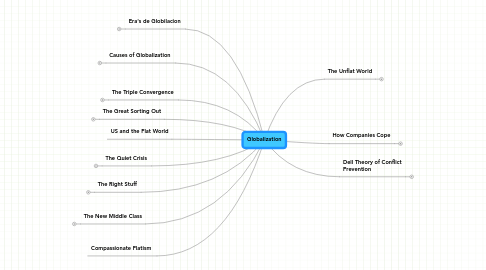
1. Causes of Globalization
1.1. Internet
1.1.1. Enables others flattners, such as uploading, workflow, software, and global supply chains.
1.2. Uploading
1.2.1. Lets you share information, from one person to another much easy and quicker.
1.3. Supply Chains
1.3.1. System of organizations, people, technology, activities, information and resources involved in moving a product or service.
1.4. Fall of the Berlin Wall
1.4.1. Gave many people new oppurtunities and was the beginning of a chain of new freedoms.
1.5. Outsourcing
1.5.1. The procuring of services or products from an outside supplier or manufacturer in order to cut costs.
1.6. Offshoring
1.6.1. Having the outsourced business functions done in another country. Work is offshored in order to reduce labor expenses
1.7. Insourcing
1.7.1. The business practice of using current or resources for new tasks and projects.
1.8. Work Flow Software
1.8.1. Network of retailers, distributors, transporters, storage facilities, and suppliers that participate in the production, delivery, and sale of a product of the consumer.
1.9. 'Steroids'
1.9.1. Things such as cell phones and laptops that give people access to information and communication with others.
1.10. Informing
1.10.1. The ablility to search anything and everything on the world wide web.
2. Era's de Globilacion
2.1. Globalizaion 1.0
2.1.1. Columbian Exchange
2.2. Globalization 2.0
2.2.1. Industrial Revolution
2.3. Globalization 3.0
2.3.1. Y2K
3. The Triple Convergence
3.1. Flatteners
3.2. New Bussiness Oppurtunity
3.3. Billions of new people entering the work force.
4. The Great Sorting Out
4.1. India v. Indiana
4.1.1. In the end this poses the question whether its the out-sourced or the outsourcee that is getting the short end of the stick.
4.2. Where do companies start and stop
4.2.1. This poses the question on whether companies are bound to their home country or whether they would dump it in a heart beat for the sake of profit.
4.3. From command to control, to collaborate and connect
4.3.1. Points out that now that the flattening of the world has taken place that people are always in contact with each other whether thats a good or bad thing.
4.4. Who owns what
4.4.1. Explains now we need protection of intellectual property and music do to the fact the internet makes it so easy to steal such ideas and creations and distribute them for free.
4.5. Death of the salesman
4.5.1. With the advent of the internet and the shopping thats now possible online the days of the salesman selling his shtick to you to try to get you to buy something are coming to an end.
5. US and the Flat World
6. The Quiet Crisis
6.1. Ambition Gap
6.1.1. Generally Americans are more worried about social standing and making money then achieving something and being at the top.
6.2. Numbers Gap
6.2.1. Americans only graduate a miniscule number of people in science and engineering, compared to India and China who graduate multitudes of students in these fields every year.
6.3. Education Gap: Top
6.3.1. We as a country are not getting kids interested in Math and Science as much as we could.
6.4. Education Gap:Bottom
6.4.1. The approach to teaching is the same as it was over a hundred years ago with unneccesary classes and practices that are a waste of taxpayer money and students time in school.
6.5. Funding Gap
6.5.1. We need money, but two bit republicans dont like spending money on the youth to educate them.
6.6. Infrastructure Gap
6.6.1. Broadband wise we are a completely under-performing country, Japan pays ten dollars for a speed forty times faster then what we have.
7. The Right Stuff
7.1. Navigation
7.1.1. Everyone needs the skills to use the internet to its full extent by learning how to "navigate" it correctly.
7.2. CQ+PQ>IQ
7.2.1. Creativity and passion are more important then IQ because they drive you towards your goals more then just having the average knowledge.
7.3. Liberal Arts
7.3.1. Students and people in general need liberal arts to expand their thinking power and so they can connect things that ordinarily wouldnt go together to make new things.
7.4. Right Brain
7.4.1. People need to become more adept at using their right brain, or the side that makes imagination and ideas more so then stores basic knowledge.
8. The New Middle Class
8.1. Collaborators and Orchestraters
8.1.1. We must learn to collaborate with other cuntries so that we can work together and further our jobs to become more efficent.
8.2. Synthesizers
8.2.1. the way of bringing two totally different companies or things together to make something new.
8.3. Explainers
8.3.1. People who will be able to most effectively teach our population.
8.4. leveragers
8.4.1. The people who take things that arent being used much and rear them into something else that is effective.
8.5. Adapters
8.5.1. People in the new globalized market who must have the ability to adapt to changes in the new world workplace.
8.6. Green People
8.6.1. Anyone who will work for a cleaner tommorow.
8.7. Passionate Personalizers
8.7.1. People who take a easily out sourcable job and make it un outsourceable by putting there own personal spin on it.
8.8. Math Lovers
8.8.1. People who love math and will try to teach it and get kids excited about it in the future.
9. Compassionate Flatism
10. The Unflat World
10.1. Too Sick
10.1.1. Disease stops countries from flattening because they have to focus on keeping the people healthy. A dying public can not work, therefore making globalization impossible.
10.2. Too disempowered
10.2.1. When a country takes power and makes people powerless, with no power to get jobs or futher education they are stuck in the 'twilight zone' and cannot move into globalization.
10.3. Too frustrated
10.3.1. When countries have to watch other places get jobs while none are available in their country, progress is then blocked by creation of radical groups.
10.4. Not Enough Resources
10.4.1. Without proper resources countries cannot build needed facilities, keep them running or pay for them, thus no globalization.
